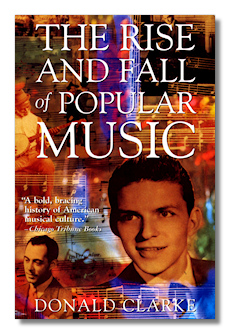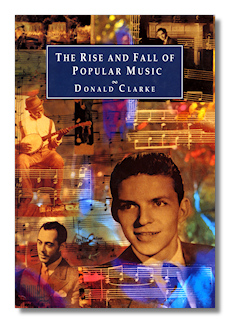
The Internet's Premier Classical Music Source
Related Links
-
Introduction
Acoustics
Ballet
Biographies
Chamber Music
Composers & Composition
Conducting
Criticism & Commentary
Discographies & CD Guides
Fiction
History
Humor
Illustrations & Photos
Instrumental
Lieder
Music Appreciation
Music Education
Music Industry
Music and the Mind
Opera
Orchestration
Reference Works
Scores
Thematic Indices
Theory & Analysis
Vocal Technique
Search Amazon
Recommended Links
Site News
 Book Review
Book Review
The Rise and Fall of Popular Music

Donald Clarke
New York: St. Martin's Press
Originally published 1995. 620 pp
ISBN: 0312142005
Many of my favorite books begin with a grabber of a sentence: for example, "All happy families are alike." Clarke's begins with "Once upon a time there were only two kinds of music in Europe: religious music and secular music." He then masterfully sweeps through roughly nine centuries in one swiftly-moving chapter. It's obvious from the first that Clarke – a native of Kenosha, Wisconsin, USA (he makes a point of that in the book), long resident in the U.K. and now back among the Yanks – has absorbed tons on the subject and has refined everything down to its essence. He has also written one of the best bios of Billie Holiday (Wishing on the Moon) – it goes against the cliché of the singer as dishrag – and edited The Penguin Encyclopedia of Popular Music, a book I haven't read, but probably should.
The problem with other books on the same subject is that either they quickly degenerate into "and then this happened" or they have some point to make that has nothing to do with what's actually happening and everything to do with crotchets in the writer's head. Charlie Gillett's The Sound of the City, for example, cited by Clarke in his abridged bibliography, concentrates on the sociological import of the lyrics to the point where he forgets all about the music. He also forgets that the music is, to a large extent, fun. Clarke doesn't make this mistake, and he provides trenchant commentary on major and minor figures alike. Furthermore, Clarke actually goes to the trouble to define "popular music." For Clarke, popular music (as opposed to the narrower "pop") is mainly American or American-derived, despite its origins as far back at least as Purcell, Vauxhall, and the broadside ballads. Certainly the commercial force behind it derived from American business practice of the late 19th century, particularly the rise of industrial monopolistic enterprise. Indeed, the word "standard" (although Clarke doesn't mention this) – despite its present connotation of a popular song that retains its currency from its birth to now – originally meant a song with a standard form: 32 bars, divided into an eight-bar strain repeated, an eight-bar contrasting strain or bridge, and an eight-bar recap of the first strain. New York publishers decreed this standard. Fats Waller's "Ain't Misbehavin'" shows it pretty well, with the section that begins "Like Jack Horner" as the contrast. This represents one of many attempts by the music industry to impose from above, from venue to content to performers. Leaving aside the abilities of the various performers, I doubt very many were seeking out Guy, Frankie Avalon, Fabian, Courtney Love, Milli Vanilli, or Britney Spears before they recorded, and I doubt in ten years anyone will be seeking out their records – all heavily hawked and promoted in their day.
Clarke makes a very good case for innovation and revitalization coming from places the music industry ignores. In short, the vital popular music almost always comes from "below" – civilians decide they like what they hear. Then the industry discovers it and co-opts it for mass production if it can. Not only is most of the commercially successful pop dominated by sampling and other technical toys, but the tempo of most fast songs is actually the same, from label to label and artist to artist. We get mainly an assembly-line product, but with our minimal choice of color and accessories. Can anybody tell the difference between the music of Phil Collins and Celine Dion? The danger is, however, that there are fewer and fewer places for new pop music (as opposed to the machine-produced stuff) to find its audience away from the industry, although there are still clubs and small labels, at least where I live, in New Orleans. Furthermore, as Clarke points out, despite little industry interest and limited distribution of the small labels, it's still possible to find interesting performers like Anthony Braxton, Dr. Michael White's Original Liberty Jazz Band, the fabulous Leah Chase, and Ellis Marsalis. Much of the criticism Clarke directs against the industry echoes Frederick Dannen's 1990 classic, Hit Men. However, to quote Clarke himself:
Just as it is easier to sell Japanese or German cars than to build American ones that people will buy, so it is easier to sell a million copies of one album than to sell 100,000 copies each of ten albums. (That is why all the shopping mall record shops are the same.) Today the major labels still throw a lot of shit at the wall to see what sticks, but it is much more expensive to operate that way than it was thirty-five years ago. If you guarantee Michael Jackson, Prince, Madonna, and whoever millions of dollars for each album, you are taking a very foolish risk.
and
Our only hope is that the pop-rock business goes smash, so that we can start all over again. Maybe it is only a matter of time; Michael Jackson's latest album has sold fifteen million copies at the time of writing, and apparently has not made enough money for Sony. Any industry that does business that way will go to the wall sooner or later.
The parallels with what has happened to classical music struck me immediately, where we get new performers shoved at us and hyped before they have developed a concert career as well as a narrowing of repertoire on classical radio, in the concert hall, and on CD. It's not that we don't come across "live" the music of, say, Roberto Gerhard. We don't even come across the symphonies of Max Bruch. It's not a matter of "difficult vs. comfortable," but of mechanically trying to reproduce previous success. Pop Will Eat Itself? It's got company. Both classical and pop are dominated increasingly by people who know a lot about business and law and much less about music. Outside of re-issues, the only major label I seem to be buying with any frequency is Decca, mainly for the "Entartete Musik" series. The rest are mid-sized and small companies. I suspect that many classical fans find themselves in similar, if not identical, circumstances. At any rate, Clarke makes a strong case.
Inevitable in a work of this scope, small errors creep in. A New Orleans "second line" doesn't follow the parade; it precedes it. Professor Longhair's name was Henry Roeland Byrd (not Roy Byrd). There are others, but they're all incidental and not worth discussing (so why did I even bring it up?). I also disagree with evaluations of particular writers and performers, but that's inevitable as well. Despite a marvelous chapter on the breakup of Mitch-Miller Fifties pop and the roots of the Sixties culminating in the Beatles and the Stones, I don't think Clarke has given Dylan and especially the Byrds their due. According to Paul McCartney (I quote from memory): "Everybody says The Beatles this and The Beatles that, but everybody forgets that to begin with, there was Dylan. The Byrds took Dylan and added a jangly bit. The Beatles took the jangly bit." I would also argue that Dylan continues to influence singer-songwriters, including, Springsteen, Griffith, and Carpenter. It bothers me there's nothing on Zappa, although one could argue his career as an anomaly.
If I've concentrated on the Sixties, it's because we tend to talk about the pop that was around when we grew up. The personal enters into general history. For Clarke, slightly older than me, this comes in around the music of the mid-Fifties. Here, we get one person's testimony about the power of good pop to get inside you and mingle with the other parts of your life. I may admire Duke Ellington enormously, but Zappa evokes memories of an exciting time I lived through. At any rate, in spite of the periods I've emphasized, Clarke does a masterful job all the way through, particularly from the 1920s through the early post-World War II period – the classic period of American vernacular music – when a lot of music was both popular and good. His discussion of the relations between rural black music and rural white struck home. We tend to treat the two as distinct strains, probably under the influence of marketers who sold it as "race music" and "hillbilly music." Clarke made me realize an awful lot of swapping and crossover was going on, as one can see in the music of Ray Charles, Doc Watson, Jimmie Rodgers, Bob Wills, Jerry Lee Lewis, Josh White, and Chuck Berry, as well as between white Cajuns and black – Cajun and zydeco.
At any rate, a superb job. I've read no better survey of the field.
Copyright © 2000 by Steve Schwartz.



















